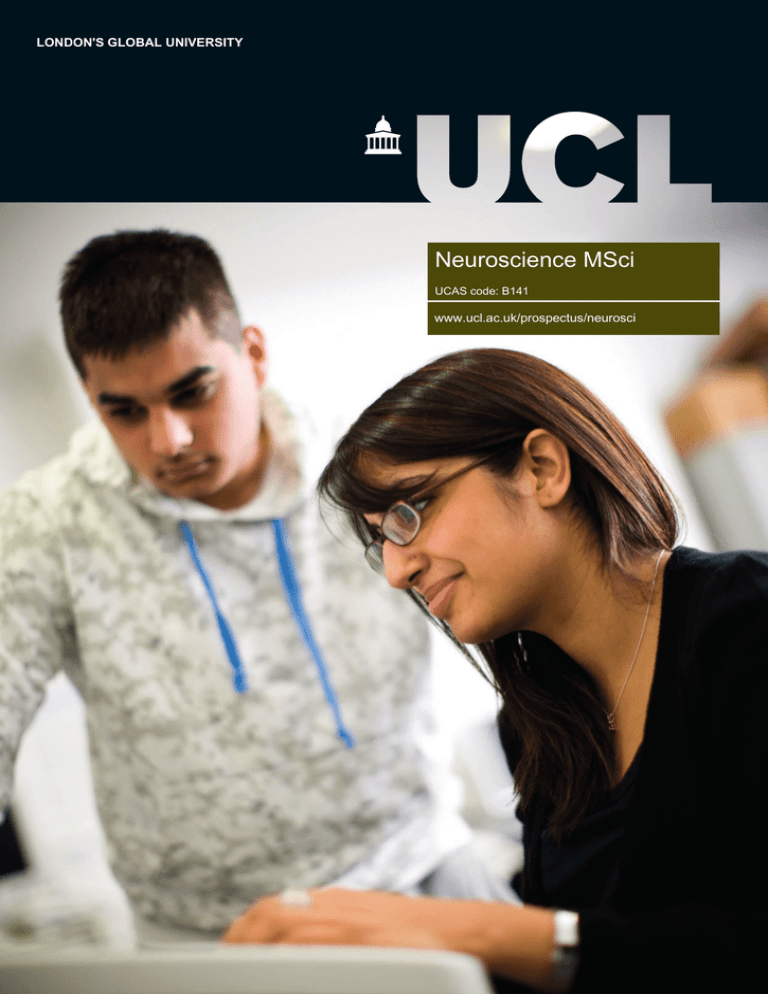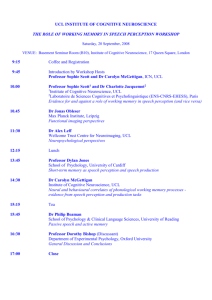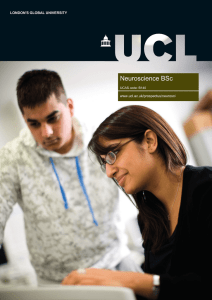Neuroscience MSci LONDON'S GLOBAL UNIVERSITY www.ucl.ac.uk/prospectus/neurosci UCAS code: B141
advertisement

LONDON'S GLOBAL UNIVERSITY Neuroscience MSci UCAS code: B141 www.ucl.ac.uk/prospectus/neurosci Neuroscience MSci The Neuroscience MSci offers an extra year on top of the Neuroscience BSc, to extend your specialised knowledge of brain function and conduct original neuroscience research. Entry requirements for both programmes are the same and you decide in year two whether to follow the three-year BSc or the four-year MSci. Degree summary • The multidisciplinary structure allows you to draw on expertise across all life sciences. As you progress, lectures will increasingly be given by specialists who are actively involved in related research. • The programme puts particular emphasis on preparing you for careers that directly involve research or require a sound understanding of its methods. • UCL and its associated institutes now represent the greatest critical mass of neuroscience researchers in Europe, with an outstanding global reputation. • Co-operation with UCL's Institutes of Neurology, Cognitive Neuroscience, Ophthalmology, Child Health, and the newly established Sainsbury Wellcome Centre for Neural Circuits and Behaviour offers unrivalled opportunities to access research laboratories for your final-year project. The first year consists of introductory core courses that provide a secure foundation for future work. Taking courses with other students in the Faculties of Life Sciences and Brain Sciences will give you mutual insight into related disciplines. Taking further core and optional courses in your second year will prepare you for the third year, in which you will select specialised options to suit your own interests; examples include Neural Basis of Motivation and Learning; Pain; Neurobiology of Neurodegenerative Disease and Visual Neuroscience, but there are many more. There is also an opportunity to transfer to the BSc programme at the end of year two, completing your degree in three years. In the fourth year you will be able to join an existing research team in one of UCL's departments or institutes to conduct an extended project of original research, guided by a supervisor. Your learning Your teaching and learning will include lectures, tutorials, workshops and practical classes. Some courses in year one are taught in relatively small groups, while others involve large lectures shared with students on other programmes. Practical classes play an important part throughout your studies, and help to prepare you for the individual research project of your final year. You will normally take a written examination at the end of the academic year in which you have taken each course, after obtaining up to 30% of your marks through coursework. Some introductory courses are examined by invigilated online tests throughout the year. Your final-year project will involve a written dissertation and an oral presentation. Your career The programme trains you to be literate, numerate, and a critical thinker, which can help you gain success in fields that do not require your specific subject knowledge, as well as in neuroscience itself. Around half of our graduates choose to pursue further studies in neuroscience or a related life science. Some join one of UCL’s own MSc or PhD programmes, while others obtain PhD scholarships at major research centres worldwide. Among other potential advantages, the MSci programme is intended to make it easier for graduates to enter future PhD programmes at European centres of research excellence. Some other possibilities are mentioned in the Neuroscience BSc Prospectus entry. The first cohort of students admitted to this programme will graduate in 2015, therefore no information about their career destinations is yet available. Career destinations of graduates (2010-2013) from the Neuroscience BSc include: • • • • • Full-time student, PhD in Neurobiology at the University of Cambridge Research Technician, UCL Institute of Ophthalmology Business Intelligence Analyst, Accenture Full-time student, MBBS in Medicine at the University of Cambridge Full-time student, Postgraduate Certificate in Education at the Institute of Education Degree structure In each year of your degree you will take a number of individual courses, normally valued at 0.5 or 1.0 credits, adding up to a total of 4.0 credits for the year. Courses are assessed in the academic year in which they are taken. The balance of compulsory and optional courses varies from programme to programme and year to year. A 1.0 credit is considered equivalent to 15 credits in the European Credit Transfer System (ECTS). Year One Compulsory courses Biochemistry and Molecular Biology Cell Physiology and Developmental Biology Chemistry for Biology Students Foundations of Neurobiology Introduction to Genetics Introduction to Neuroscience Mammalian Physiology Optional courses All first-year courses are compulsory. Year Two Compulsory courses Cellular Neurophysiology Essential Molecular Biology Human Neuroanatomy Practical Neurobiochemistry Optional courses You will select 2.0 credits from a wide range of options, including: One of the following: General and Systematic Pharmacology (1.0 credits) Introductory Pharmacology (0.5 credits) Plus at least one of the following, and a further free option that may lie outside Neuroscience: Developmental Neurobiology (0.5 credits) Systems Neuroscience (0.5 credits) The Principles of Cellular Control (0.5 credits) Year Three Compulsory course Individually-supervised literature-based project (1.0 credits) Optional courses You will select 3.0 credits from a wide range of advanced-level optional courses within Neuroscience and related disciplines. Final Year Compulsory course Individually-supervised Master's-level experimental project (currently 2.0 credits) Optional courses Currently, students select 2.0 credits from a wide range of Masters-level optional courses within Neuroscience and other related disciplines. The programme that MSci students follow in their final year is under review, and in future is expected to place additional emphasis on the experimental project and on courses supporting experimental design, experimental methods and data analysis. Entry requirements A levels A level grades AAA A level subjects Chemistry required plus one from Biology, Mathematics or Physics. AS levels For UK-based students a pass in a further subject at AS level or equivalent is required. GCSE English Language and Mathematics at grade B. For UK-based students, a grade C or equivalent in a foreign language (other than Ancient Greek, Biblical Hebrew or Latin) is required. UCL provides opportunities to meet the foreign language requirement following enrolment, further details at: www.ucl.ac.uk/ug-reqs combining academic success with extracurricular activities), self-discipline (through involvement in sports or music, for instance) and experience of working in a team environment. If you apply by the main UCAS deadline and meet or are predicted to meet all of our academic and individual requirements, including being able to demonstrate a good understanding of what this specialised subject entails, you will receive an offer of a place, either conditional or unconditional. Fees UK/EU fee £9,000 (2016/17) Overseas fee £21,320 (2016/17) Notes Details about financial support are available at: www.ucl.ac.uk/study/ug-finance Contacts IB diploma IB points 38 Subjects A total of 18 points in three higher level subjects including Chemistry and one subject from Biology, Mathematics or Physics, with no score below 5. Contact Professor Paola Pedarzani Admissions Tutor Email p.pedarzani@ucl.ac.uk Telephone Prospectus entry www.ucl.ac.uk/prospectus/neurosci Other qualifications Full lists of all degree programmes and other entry requirements can be found on our website at: www.ucl.ac.uk/otherquals Undergraduate Preparatory Certificates UCL's Undergraduate Preparatory Certificates (UPCs) are intensive one-year foundation courses for international students of high academic potential, who are aiming to gain access to undergraduate degree programmes at UCL and other top UK universities. For more information see our website: www.ucl.ac.uk/upc Your application Application for admission should be made through UCAS (the Universities and Colleges Admissions Service). Applicants currently at school or college will be provided with advice on the process; however, applicants who have left school or who are based outside the United Kingdom may obtain information directly from UCAS. The entry requirements and selection process for the Neuroscience BSc and MSci are the same. In addition to meeting the entry requirements, you must demonstrate in your application an understanding of what studying neuroscience entails, and why you are motivated to study it. Desirable skills include time-management abilities (perhaps shown by PDF Updated: February 23, 2016 Information correct at time of going to press. See website (www.ucl.ac.uk/prospectus/neurosci) for latest information Key facts REF 83% rated 4* (‘world-leading’) or 3* (‘internationally excellent’) Department Division of Biosciences Faculty Life Sciences



